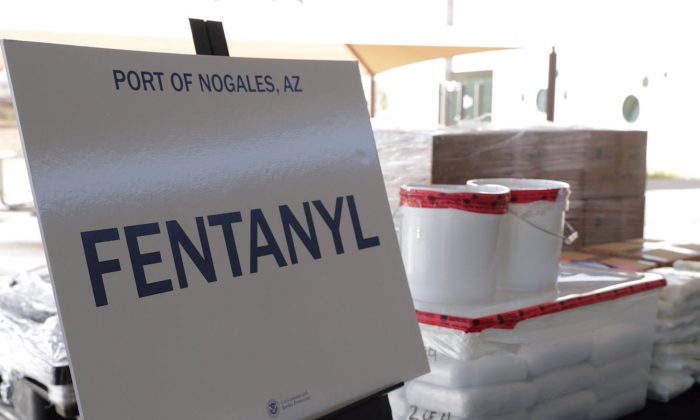
Packets of fentanyl mostly in powder form and methamphetamine, which U.S. Customs and Border Protection say they seized from a truck crossing into Arizona from Mexico, is on display during a news conference at the Port of Nogales, Ariz., on Jan. 31, 2019. (U.S. Customs and Border Protection/Reuters)
Chinese National Charged With Importing Fentanyl Analogues to US
May 23, 2019
A Chinese national who has held high-level executive positions in Chinese chemical and pharmaceutical companies was arrested and charged with importing more than 1,000 pounds of drugs, including fentanyl analogues, to the United States, the U.S. Justice Department said on May 22.
Hao Qin, also known as “John Chin,” 32, was arrested after landing at the Los Angeles International Airport on May 21, and made an initial appearance in the U.S. District Court in the Central District of California the next day. He was charged with drug and money laundering offenses.
U.S. prosecutors allege that since at least 2012, Qin, along with several co-conspirators, used pharmaceutical and chemical companies in China to distribute more than 1,100 pounds (500 kilograms) of synthetic drugs and analogues to the United States. The companies Qin worked for weren’t publicly identified by federal law enforcement.
During the time of the alleged conspiracy, Qin held high-level executive positions in those companies, and worked with individuals, including another executive and an assistant, to carry out the scheme, according to court documents.
Among the drugs imported through Qin’s chemical business were two potent analogues of the opioid drug fentanyl: furanyl fentanyl and 4-FIBF, the DOJ said.
According to court documents, Drug Enforcement Administration (DEA) agents received information about Qin’s activities from his former client in the United States, who started cooperating with the agency’s investigation in 2016.
Prosecutors also charged Qin with laundering the proceeds of his international drug business. This included allegedly receiving wire payments from a former client who was paying off a drug debt of more than $500,000 owed to Qin.
If found guilty, Qin faces up to 20 years in prison and a fine of $1 million if convicted of conspiracy to import drug analogues, and up to 20 years imprisonment and a fine of $500,000 if convicted of money laundering.
Fentanyl Crisis
The U.S. administration has repeatedly pressured the Chinese regime to clamp down on the production and distribution of the synthetic opioid fentanyl that has flowed to the United States and fueled the opioid crisis.
An explosion in the use of fentanyl, an opioid painkiller, and its analogues, has driven the most devastating chapter of America’s long-running opioid crisis, U.S. law enforcement agencies say. China manufactures most of the fentanyl and fentanyl analogues seized.
Fentanyl is 100 times more potent than morphine and 50 times more powerful than heroin, according to the U.S. Centers for Disease Control and Prevention (CDC); as little as two milligrams is considered a lethal dosage for most people.
The United States recorded more than 28,000 synthetic opioid-related overdose deaths in 2017, according to the CDC, the majority of them fentanyl-related.
Chinese leader Xi Jinping promised U.S. President Donald Trump at a summit in Argentina in December that Beijing would crack down on the flow of all fentanyl-related substances.
In April, Beijing pledged that from May 1, it would expand the list of narcotics subject to state control to include more than 1,400 known fentanyl analogues, which have a slightly different chemical makeup but are all addictive and potentially deadly, as well as any new ones developed in the future.
U.S. experts, officials, and lawmakers, however, are skeptical about whether the Chinese regime will enforce the measures.
No comments:
Post a Comment
Comments always welcome!